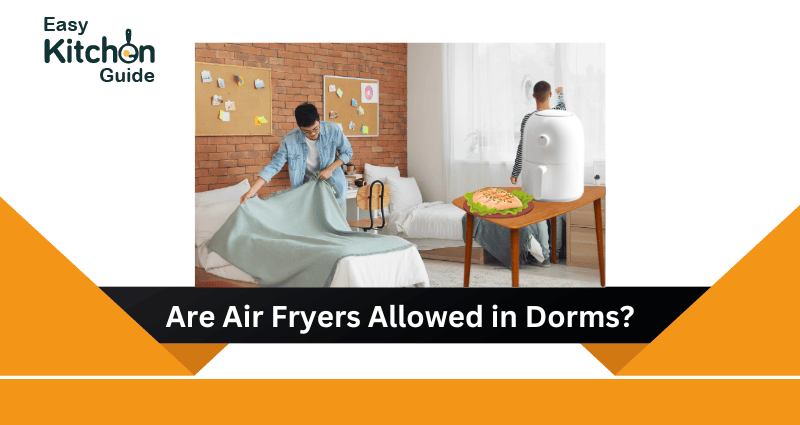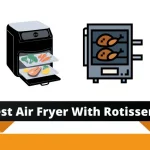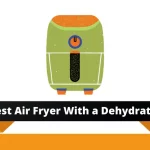Are you a college student about to move into your new dorm room and fantasizing about tasty prepared meals? If that’s the case, you might wonder if it’s appropriate to bring air fryers to dorms. In recent years, air fryers have become a dorm room essential, and many colleges and universities are quite air fryer-friendly. So, before you stash away your favorite crispy snack maker, let’s explore the ins and outs of air fryer rules in dorms, ensuring your student life is sizzling with convenience and flavor.
What’s an Air Fryer, and Why Do You Need One in Your Dorm Room?
Table of Contents,
An air fryer is a compact kitchen appliance that uses hot air to cook food, functioning like a mini convection oven. It circulates hot air around the food to crisp it up, similar to deep-frying but with significantly less oil. This kitchen gadget allows health-conscious college students to enjoy crispy and delicious dishes with a fraction of the calories and fat.
How an air fryer Works
The air fryer has a heating element and a fan that blows hot air around the food in a small cooking chamber. This hot air rapidly cooks the food, creating a crispy outer layer while keeping the inside moist and tender. It’s perfect for cooking a wide variety of dishes, from french fries to chicken wings and even baked goods.
Benefits of using in a dorm
In a college dorm, space is a premium commodity, and an air fryer’s compact size is a game-changer. With the versatile ability of air fryers, You can prepare a range of meals with no stove or oven. Plus, Air frying produces fewer cooking odors compared to traditional frying. it’s easy to clean, which is a big plus for busy students.
Rules and Regulations for using Air fryers in college dorms
You only use an air fryer in your college dorm room if your university allows you, depending on the specific rules and regulations set by your university. Some colleges allow small cooking appliances, including air fryers, while others may have restrictions. It’s essential to familiarize yourself with your college’s policies.
Many times, students need to get permission from the college or residence hall to use an air fryer. This step ensures that you’re aware of the rules and safety regulations surrounding these appliances. It’s a straightforward process, and compliance is key to enjoying your air fryer.
How do fire safety regulations come into play?
Fire safety is a significant concern in dorms, which applies to appliances like air fryers. These devices contain heating elements, and if used improperly, they can pose a fire hazard. Before getting the benefits of electric appliances, it is important to understand the regulation of dorm rooms and follow fire safety regulations to ensure your safety and the safety of your fellows. Here’s an explanation of how fire safety regulations apply when using an air fryer in a dorm room.
I have also written a detailed guide on what to Do if your air fryer catches fire.
Heating Elements and Fire Hazards:
Air fryers, like many other kitchen appliances, have heating elements. These elements can get very hot during operation. If not used correctly, they can pose a fire hazard, especially in the confined spaces of a dorm room.
Understanding Appliance Usage:
Fire safety regulations often require students to be well-informed about how to use appliances safely. They should understand the specific operation of an air fryer, how to set temperatures and cooking times, and be aware of potential risks.
Overcrowding the Basket:
Air fryers work by distributing hot air around the food inside a basket. Overcrowding the basket with food can impede proper air circulation and lead to overheating, which can be a significant fire hazard. Following the appliance’s recommended guidelines for food quantities is crucial.
Unattended Usage:
One of the primary causes of kitchen-related fires is leaving appliances unattended while they’re in use. Students are often required to stay present and vigilant when an air fryer is in operation to prevent potential accidents.
Regular Maintenance and Cleaning:
Fire safety regulations also often emphasize the importance of regular appliance maintenance, including cleaning. They should keep air fryers clean to prevent the buildup of oil and food residue, which can become flammable over time.
Unplugging When Not in Use:
To minimize the risk of electrical issues and potential overheating, students should unplug their air fryers when they’re not in use. Unplugging is especially important in dorm rooms with limited electrical capacity.
Compliance with Dorm Policies:
Most colleges have specific policies in place to ensure fire safety in dorms. These policies also include restrictions on the types of cooking appliances allowed, as well as guidelines for their safe use. Students must read those policies carefully to comply with those policies. They can also discuss permission on time if their management does not allow them to bring in their dorm room.
Smoke Detectors and Fire Alarm:
Many dorm rooms are equipped with smoke detectors and fire alarms. If an air fryer use triggers these alarms due to smoke or elevated temperatures, students should be aware of the appropriate response, which typically involves evacuating the dorm room and cooperating with authorities.
Emergency Preparedness:
In dorms, it’s essential to have a clear understanding of emergency procedures. Students should know what to do in case of a fire or when the fire alarm goes off, including where to exit the building and how to reach safety.
Communication and Reporting:
Open communication is crucial. If an accident or fire-related incident occurs involving an air fryer, it’s vital to report it promptly to residence hall authorities or campus safety personnel. This step ensures that proper action can be taken to address any safety concerns.
Fire safety regulations regarding the use of an air fryer in a dorm room are in place to lessen the potential risks associated with cooking appliances. Students must know these regulations, follow safety guidelines, and comply with their college’s policies to maintain a safe and secure living environment in the dorms.
College Dorm Cooking: More Than Just Air Fryers
Which other kitchen appliances are allowed in dorm rooms besides the air fryer?
Besides air fryers, college dorms often allow students to bring other cooking appliances like toaster ovens, microwaves, and mini-fridges. These appliances can provide alternatives for cooking in your dorm room.
Toaster ovens are versatile for baking and toasting, while microwaves are great for reheating and cooking simple meals. A mini-fridge is essential for storing perishable items and keeping beverages cool, making it a staple in every college dorm.
You do not need to worry If your college doesn’t allow air fryers or you’re looking for quick meal alternatives. you can prepare simple dishes using a microwave or toaster oven. Consider microwave-safe cookware and easy-to-make recipes that suit your cooking appliances.
Where can I get information on college dorm room policies regarding the usage of air fryers?
Most colleges provide information about their dorm policies on their websites or in their housing handbooks. Additionally, College appliance policies can vary, so it’s necessary to research and understand the specific rules at your institution. Some colleges may have additional restrictions or allowances. You can contact your residence hall coordinator or housing office for guidance on using air fryers in your dorm.
How to Request Permission for Air Fryer Usage in College Dorms
If your college dorm does not allow air fryers, but you’re eager to use one, reach out to your residence hall coordinator or housing authority to inquire about obtaining special permission. You can typically find their contact information on your university’s website or by asking your resident advisor. Explain your reasons and willingness to comply with safety regulations. Stress your commitment to safety and willingness to comply with any rules or restrictions they may have. Assure them you’ll take all necessary precautions to prevent any hazards. If they request more information or time to consider your request, be patient and provide any additional details they need promptly.
Remember, every college may have its own policies and procedures, so be prepared to adapt to their specific requirements. By approaching the request professionally and responsibly, you increase your chances of obtaining permission to use your air fryer in your dorm room.
Safety Compliance Using in Dorm Room:
Fire Hazards and Air Fryers:
Air fryers contain a heating element that gets very hot. If not used correctly, this element can pose a fire hazard. Understanding how your air fryer works and following safety guidelines is essential to prevent accidents.
Avoid Overcrowding:
To prevent accidents, avoid overcrowding the air fryer basket, as it can impede air circulation and lead to overheating. Always unplug your air fryer when not in use to minimize the risk of electrical issues.
Alarm Signal:
If the fire alarm in your dorm goes off while using an air fryer, act swiftly and calmly. Unplug the appliance, open windows, and evacuate the dorm if necessary. Follow the instructions of your residence hall or housing authorities.
In college dorms, air fryers can enhance your meals, but follow the rules closely. Policies vary, so seek permission if needed and prioritize fire safety. Toasters, microwaves, and mini-fridges are also dorm-friendly. Check your college’s guidelines online or in handbooks. Reach out to your dorm coordinator if you require permission. With knowledge and responsibility, enjoy the convenience of air frying while keeping your college life delicious and safe.







